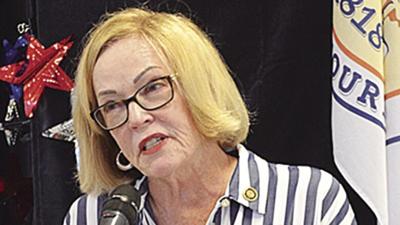Sen. Elaine Gannon (R-De Soto) said two years of work on an issue important to her just paid off.
She got a provision attached to a newly approved piece of legislation that addresses “patient boarding” – the practice of keeping foster children and adult wards of the state in medical hospitals indefinitely because they have nowhere else to go.
Gannon said she previously filed bills in the 2022 and 2023 sessions to address the problem, but they weren’t approved.
However, in the waning days of this year’s legislative session, which ended May 12, Gannon approached state Rep. Mike Henderson (R-Bonne Terre) about attaching her proposal to a bill he sponsored dealing with various health issues.
Missouri Gov. Mike Parson signed that bill, along with 31 others, into law on July 6. Parson has until July 14 to sign legislation.
“It’s a victory,” Gannon said. “My name does not have to be on it. Mike (Henderson) graciously allowed me to put this bill as an amendment to his in the late days of the session. When it’s getting late in the session, it’s normal for someone who sponsors a bill to approach someone else and ask if they would allow an amendment if it fits onto their bill. It’s a courtesy. Sometimes it’s yes, and sometimes it’s no, but this time it was a yes.”
What Henderson – and ultimately Parson – said yes to is a requirement that state officials who deal with the foster system get together and hammer out solutions to what Gannon said is a pressing problem.
“Patient boarding is something that’s happening right now and has been happening for some time,” she said. “Foster children enter the hospital for a health issue, and when it comes time to release them, sometimes there’s nowhere for them to go because the foster family doesn’t want the kid back for whatever reason.
“And because there’s such a low number of foster parents in this state, there is nowhere else for them to go, so they stay in the hospital,” she said. “They go to school in the hospital. I’m not sure how that works, but they do.”
As anyone who’s had to pay a hospital bill can attest, even an overnight stay is costly.
“And the state is funding all this,” she said. “I’m pretty sure Mercy Hospital Jefferson (in Crystal City) has some of these patient boarders.”
Staffing issues, which started during the pandemic, have continued as foster care workers left to take higher-paying but less-demanding jobs, leading to a decline in the number of places that will accept foster children and adults with disabilities.
The new law requires officials from the state Department of Mental Health and the Department of Social Services to gather information and provide reports on the issue, which she said also affects adults with disabilities, often wards of the state who are boarded at medical facilities after they should be discharged because of a lack of other residential options.
“They (the state officials) are to sit down with people in the field and develop a sustainable solution, identify gaps in service and apply resources where and when necessary to address this issue,” Gannon said.
Emphasis, according to the new law, is to make sure patients are being cared for in the least restrictive environment in a cost-effective manner.
Initial reports are due by Dec. 31, 2023, and July 1, 2024, with a final report due by Dec. 1, 2024.
Gannon said dialogue among those involved in the foster care field is ongoing.
She said a similar piece of legislation she sponsored in the 2022 session didn’t make it to Parson’s desk, but the groundwork for this year’s success started at a committee hearing where Michelle Schafer, regional vice president for behavioral health for SSM Health, testified in favor of Gannon’s bill.
“I didn’t know her, and she didn’t know me, but after the hearing, I went to my office and she followed me. Then she sat down and we started talking, and we talked for 45 minutes. As I sat there and listened to all the problems she laid out, I told her that we could either talk and wait for a bill to be passed, or we could do something.
“She just looked at me with big eyes and said, ‘What are we going to do?’ I told her that we would get together the people involved and form a committee that eventually became the Children’s Behavioral Health Committee.
“I told her, 'I don’t know who should be on this committee, but you do. I need you to get me a list of people in the field. The top people, not the people who are third or fourth in command.'”
Schafer did, but Gannon nominated someone she knows – former Jefferson County Circuit Judge Darrell Missey, now director of the state’s Children’s Division.
“The first time we met, in April 2022, I didn’t know who would come or how many would come. We had about a dozen people, and it was a good, productive talk. The second meeting, the group grew, and now it includes about 30 or 35.
“After the most recent meeting, Darrell came up to me and said, ‘Elaine, this is one of the best things that has ever happened. I think we’ll be able to make a difference.’”
She said the committee will contribute to the required reports, but more importantly, address one of the central issues in the foster care-disabled adult care system.
“One thing I had heard is that nothing was getting done because no one knew where to turn. This addresses that. And the committee is also looking for ways to keep kids with their families and out of the foster care system, which, of course, will ease the caseloads and reduce patient boarding.”
A bill that Gannon sponsored, extending postpartum coverage through MO HealthNet for low-income mothers from 60 days to a year, also was signed into law by Parson on July 6.
Gannon said she’s heard from Parson’s office that he plans to hold a ceremonial bill-signing in Jefferson County soon.




